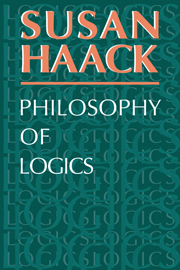Book contents
- Frontmatter
- ACKNOWLEDGMENTS
- Contents
- Preface
- Notation and abbreviation
- 1 ‘Philosophy of logics’
- 2 Validity
- 3 Sentence connectives
- 4 Quantifiers
- 5 Singular terms
- 6 Sentences, statements, propositions
- 7 Theories of truth
- 8 Paradoxes
- 9 Logic and logics
- 10 Modal logic
- 11 Many-valued logic
- 12 Some metaphysical and epistemological questions about logic
- Glossary
- Advice on reading
- Bibliography
- Index
7 - Theories of truth
Published online by Cambridge University Press: 05 June 2012
- Frontmatter
- ACKNOWLEDGMENTS
- Contents
- Preface
- Notation and abbreviation
- 1 ‘Philosophy of logics’
- 2 Validity
- 3 Sentence connectives
- 4 Quantifiers
- 5 Singular terms
- 6 Sentences, statements, propositions
- 7 Theories of truth
- 8 Paradoxes
- 9 Logic and logics
- 10 Modal logic
- 11 Many-valued logic
- 12 Some metaphysical and epistemological questions about logic
- Glossary
- Advice on reading
- Bibliography
- Index
Summary
A summary sketch
The object of this section is to sketch the main kinds of theories of truth which have been proposed, and to indicate how they relate to each other. (Subsequent sections will discuss some theories in detail.)
Coherence theories take truth to consist in relations of coherence among a set of beliefs. Coherence theories were proposed e.g. by Bradley 1914, and also by some positivist opponents of idealism, such as Neurath 1932; more recently, Rescher 1973 and Dauer 1974 have defended this kind of approach. Correspondence theories take the truth of a proposition to consist, not in its relations to other propositions, but in its relation to the world, its correspondence to the facts. Theories of this kind were held by both Russell 1918 and Wittgenstein 1922, during the period of their adherence to logical atomism; Austin defended a version of the correspondence theory in 1950. The pragmatist theory, developed in the works of Peirce (see e.g. 1877), Dewey (see e.g. 1901) and James (see e.g. 1909) has affinities with both coherence and correspondence theories, allowing that the truth of a belief derives from its correspondence with reality, but stressing also that it is manifested by the beliefs' survival of test by experience, its coherence with other beliefs; the account of truth proposed in Dummett 1959 has, in turn, quite strong affinities with the pragmatist view.
- Type
- Chapter
- Information
- Philosophy of Logics , pp. 86 - 134Publisher: Cambridge University PressPrint publication year: 1978



